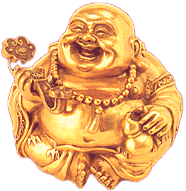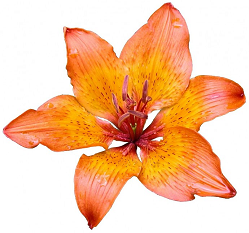|
|



|
Random Image
The Dhammapada
Chapter Twenty Six: The Brahmin
Strive and cut off the stream.
O brahmin, dispel sensual craving.
Knowing the ending of all formations,
You, brahmin, will know the Unmade.
When, with tranquility and insight,
The brahmin reaches the other shore,
Then for that "knowing one"
All fetters come to their end.
Whoever is
Untied and free of distress,
And for whom neither a "beyond," a "not-beyond,"
Nor a "both beyond-and-not-beyond" exist,
I call a brahmin.
Whoever is
Seated, absorbed in meditation,
Done what had to be done,
Free of contaminants,
Who has reached the highest goal,
I call a brahmin.
The sun shines by day.
The moon glows at night.
The warrior shines in his armor.
The brahmin shines in meditative absorption.
But all day and all night,
The Buddha shines in splendor.
Having banished evil,
One is called a brahmin.
Living peacefully,
One is called a renunciant.
Having driven out one's own impurities,
One is called "one who has gone forth."
One should not strike a brahmin
And a brahmin should not set anger loose.
Shame on the one who hits a brahmin
And greater shame on the one who sets anger loose.
For the brahmin, nothing is better
Than restraining the mind
From what it cherishes.
Whenever one turns away from the intent to harm,
Suffering is allayed.
Whoever does no ill
Through body, speech, and mind,
And is restrained in these three areas,
I call a brahmin.
As a brahmin worships a ritual fire,
One should respectfully worship
Anyone from whom one might learn
The Dharma of the Fully Self-Awakened One.
Not by matted hair, not by clan,
Not by birth does one become a brahmin.
The one in whom there is truth and Dharma
Is the one who is pure, is a brahmin.
Fool! What use is matted hair?
What use is a deerskin robe?
The tangled jungle is within you
And you groom the outside!
Someone robed in discarded rags,
Lean, with veins showing,
Alone in the forest, absorbed in meditation,
I call a brahmin.
I call no one a brahmin
For being born from a womb, from a mother.
Someone who has anything
Is called "self-important."
Whoever has nothing and does not cling,
I call a brahmin.
Whoever, having cut off every fetter,
Does not tremble,
Is unbound and beyond attachment,
I call a brahmin.
Whoever, awakened, has cut
The strap, thong, cord, and bridle,
And lifted up the crossbar,
I call a brahmin.
Whoever endures abuse, assault, and imprisonment
Without animosity,
And who has forbearance as one's strength,
As one's mighty army,
I call a brahmin.
Whoever is without anger or craving,
Observant in spiritual practice and virtue,
Self-controlled, and in one's final body,
I call a brahmin.
Like water on a lotus leaf,
Or a mustard seed on the tip of an awl,
Whoever does not cling to sensual craving,
I call a brahmin.
Whoever knows, right here,
The ending of suffering,
Who is unburdened and unbound,
I call a brahmin.
Whoever is wise,
Of profound insight,
Understanding what is and isn't the path,
And who has attained the highest goal,
I call a brahmin.
Whoever is not mixed up with
Householders or renunciants,
Who has no abode and few desires,
I call a brahmin.
Having given up violence
Toward beings both timid and strong,
Whoever neither kills nor causes others to kill,
I call a brahmin.
Whoever is unopposing among those who oppose,
Peaceful among the violent,
Not clinging among those who cling,
I call a brahmin.
Whoever lets passion, aversion,
Conceit, and hypocrisy fall away
Like a mustard seed from the tip of an awl,
I call a brahmin.
Whoever speaks
What is true, informative, and not harsh,
Who gives offense to no one,
I call a brahmin.
Whoever in this world
Takes nothing not given,
Whether it is long or short,
Large or small,
Beautiful or not,
I call a brahmin.
Whoever has no longing
For this world or the beyond,
Who is unbound and without longing,
I call a brahmin.
Having no attachments,
And, through understanding, free of doubts,
Whoever is established in the Deathless
I call a brahmin.
Whoever here has overcome attachments
For both merit and evil
And who is sorrowless, dustless, and pure,
I call a brahmin.
Whoever, like the moon,
Is spotless, pure, clear, and undisturbed,
In whom the delight for existence is extinct,
I call a brahmin.
Whoever has passed beyond this troublesome road,
This difficult path, this samsara, this delusion,
Who has crossed over, gone beyond,
Who is a meditator, free of craving and doubt,
Without clinging, released,
I call a brahmin.
Whoever, having given up passion here,
Would go forth as a "homeless one,"
In whom the passion for existence is extinct,
I call a brahmin.
Whoever, having given up craving here,
Would go forth as a "homeless one,"
In whom the craving for existence is extinct,
I call a brahmin.
Whoever, having given up human bondage,
Has gone beyond heavenly bondage,
Is unbound from all bondage,
I call a brahmin.
Whoever, having given up liking and disliking,
Has become cooled, without attachments,
A hero overcoming the entire world,
I call brahmin.
Whoever knows in every way
The passing away and reappearing of beings,
And is unattached, awakened, and well-gone,
I call a brahmin.
An arahant, whose destination is not known
By gods, gandhabbas, or humans,
Whose toxins are extinct,
I call a brahmin.
One for whom nothing exists
In front, behind, and in between,
Who has no clinging, who has nothing,
I call a brahmin.
Whoever is most excellent, a bull,
A hero, a great sage, a conqueror,
Free of craving, cleansed, awakened,
I call a brahmin.
Whoever
Knows one's own former lives,
Sees both the heavens and states of woe,
Has attained the end of birth,
Is a sage, perfected in the higher knowledges,
And has perfected all perfections,
I call a brahmin.
END
...excerpt from The Dhammapada



Contact • Feedback • Typo • Privacy • Home